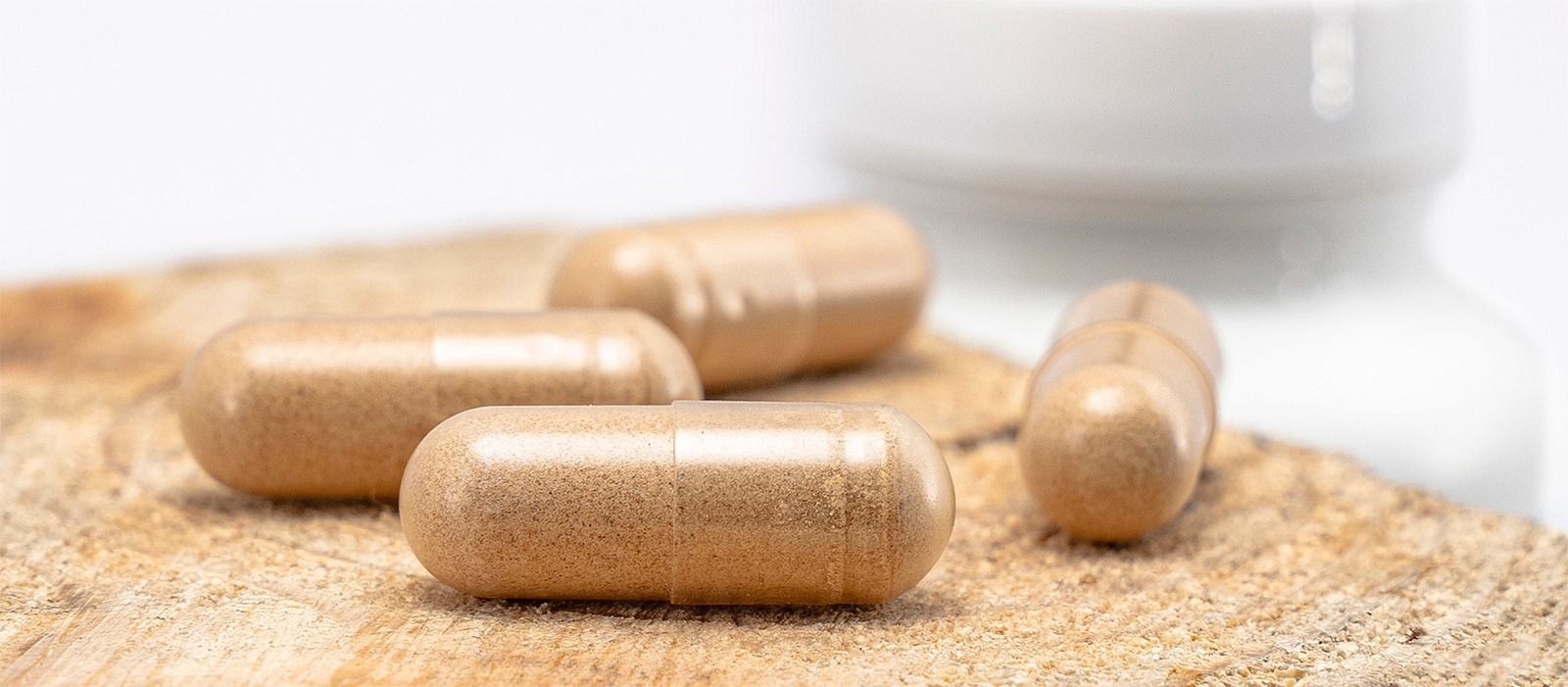Whether you’re embarking on Whole30 for the first time or considering another round, you might be asking yourself whether you need vitamins and supplements to make the most of your 30-day experiment. (Google searches tell us many of you are wondering.)
The short answer is that they’re never necessary for Whole30 success. However, we recognize you might want to include some vitamins, minerals, or other macronutrients to support your health, even with a whole-food approach like the Whole30. So here’s an overview of why you might choose to utilize a few compatible supplements during your Whole30 and beyond. You’ll also find a helpful guide to common supplements shown to have some benefits for optimizing your health—on or off a Whole30.
Do I need vitamins because I’m doing a Whole30? (Hint: No.)
Completing a Whole30 and temporarily removing specific categories of food doesn’t mean you’re getting less nutritional value. In fact, by substituting vegetables and fruits for bread, pasta, and rice, you may be getting more!
Think about your typical plate of food. If, instead of a quarter of it being rice, you’re filling up that space—and more—with nutrient-dense veggies, you’ll take in more micronutrients than before. And by paying closer attention to what you consume, you also might find you’re including a greater variety of whole foods (especially vegetables) in your meals than before. That variety is a key to acquiring a broad-spectrum of nutrients from your diet.
In other words, you don’t need to add any new vitamins or supplements just because you’re doing a Whole30.
Should I consider adding vitamins or supplements to make my Whole30 better? (Hint: Maybe!)
We’ve established that you don’t need new vitamins during your Whole30. But there are a few reasons you may choose to consider supplementing with them.
- You want to optimize your Whole30 experience.
- Most likely, part of your decision to do a Whole30 involved a desire to change your relationship with food. During your program, you’ll likely pay much closer attention to what and how you eat. While the food you’re consuming during the Whole30 is most likely more nutritionally diverse and dense than what you were eating before, a few choice vitamins and minerals can help you “level up” your non-scale victories. That includes support in areas like brain function, gut health, and even mood or mental health.
- You are still expanding your palate, and there might be unintentional gaps in your nutrition.
- That’s a polite way to say that you might be…a picky eater. (Not that there’s anything wrong with that.) Part of preparing for a Whole30 involves taking a close, personal look at your eating tendencies, so you can design your most joyful, healthy, authentic menu. You aren’t going to eat what you don’t like, and if what you like is limited, there might be gaps. Even if you like variety, you might be leaning more heavily on one meal or ingredient during the first week or two, while you’re adjusting to cooking more often. In those contexts, vitamins could supplement your nutritional needs.
- You’re working on gut support.
- We aren’t just what we eat; we’re what we absorb. According to Frederick Health, if you experience warning signs like frequent upset stomach, trouble sleeping, frequent fatigue, extreme food cravings, migraines, skin issues, and even frequent mood changes, you might have issues with your microbiome (the balance of bacteria). This could mean your body isn’t optimally processing food—or getting energy from it. In those cases, regardless of whether or not you’re on a Whole30, you might consider adding a few supplements to help support gastrointestinal health and a healthy gut microbiota, to ensure you’re absorbing as much good stuff from your food as possible.
- You’re conscious of changes in the quality of our overall food supply.
- As mass production and distribution became necessary in the global economy, some studies have suggested we made trade-offs between yield and nutrient content. According to this summary from the BBC, “Supermarket staples have been getting bigger, juicier, and more appealing. But their nutritional content has not been keeping pace.” Those changes are hardly specific to the Whole30—and the food production system won’t change overnight. But one thing you can do to compensate is strategically add specific vitamins and minerals.
I’d like to add some vitamin supplementation during my Whole30. How do I know what to choose? (Hint: There are a few common micronutrients that help most people.)
An elimination diet (like Whole30) is the gold standard for identifying food intolerances, but lab testing under a physician’s care is the best way to identify any micronutrient (vitamin and mineral) deficiencies specific to your body. That’s why we always recommend working directly with your healthcare provider. However, there are a few common supplements we consider nearly-universal helpers.
We also encourage you to consider your personal Whole30 goals, and whether changing too much at once could affect your personal experiment. If you add too many new supplements on top of a revised dietary plan, it could be hard to differentiate what’s having a positive (or negative) effect on your body. More isn’t always better; you (and your doctor) know your body and its needs best.
Basic Supplements for Your Consideration
Vitamin D
According to Cleveland Clinic, vitamin D “plays a crucial role in maintaining the balance of calcium in your blood and bones. Specifically, you need vitamin D so your body can use calcium and phosphorus to build bones and support healthy tissues.” Vitamin D is also critical for immune support and could also play a role in mental health. Cleveland Clinic also cites data showing that about 35% of adults in the U.S. are vitamin D-deficient. Deficiencies can lead to fatigue, bone pain, muscle weakness, aches, or cramps.
During your Original Whole30 and beyond, foods like ghee, fatty fish, and mushrooms are all sources of vitamin D. But this vitamin-that’s-technically-a-hormone is primarily produced in our bodies when we’re exposed to UV rays from the sun. Depending on your personal health history, your skin’s melanin content, and your geographic location, you might still not get enough even with regular sun exposure. This is especially true in winter. If lab tests to assess your personal levels aren’t available, you might consider starting with 2,000-3,000 IUs (50-75μg) per day of vitamin D3. Some people may need more. Doses of 5,000 IUs a day are well tolerated and safe. (Higher doses should only be taken under the supervision of a physician.)
Recommendations: We are big fans of Whole30 Approved Adapt Naturals Bio-Avail D3/K2 which is a synergistic blend of vitamins D3 and K2 in a concentrated, easy-to-absorb liquid form. (Adapt Naturals is the only officially Whole30 Approved supplement line!). NatureWise makes a cost-efficient vitamin D3 in organic extra-virgin olive oil, providing 5,000 iu per softgel. Thorne Research offers a vitamin D3 liquid supplement combined with K2 to promote absorption and hormone regulation.
Magnesium
According to the Mayo Clinic, magnesium “plays many crucial roles in the body, such as supporting muscle and nerve function and energy production.” But you might not even know if you have low magnesium levels. One 2018 scientific study estimated up to 75% of Americans are consuming a magnesium-deficient diet, and emphasized the importance of proper magnesium levels in vitamin D absorption. (Many of the vitamins and supplements we list here are interrelated!)
Luckily, many Whole30 foods are magnesium rich, including leafy greens, nuts, and seeds. As you’re meal planning for the Whole30, one way to optimize your experience is to include plenty of magnesium sources. But you might also choose to supplement. If you do, check with your doctor about appropriate doses, to ensure you aren’t overcompensating and causing gut issues like diarrhea. Typical doses range from 125 to 600 mg per day, and several different forms are available.
Recommendations: Pure Encapsulations offers a powdered magnesium glycinate, which is often used to support deeper sleep. Natural Calm Original Flavor is a powdered magnesium citrate, a form which can also support regularity. Jarrow Formulas offers capsules with magnesium l-threonate, a form which is touted for its brain-supporting benefits.
Sodium, potassium, and other electrolytes
Eating quite a bit of processed food before starting your Whole30 means your salt intake may change significantly once you’re eating whole foods prepared at home. That might mean you feel a difference as your body adjusts to lower levels of potassium and sodium (as well as magnesium, which we covered above). If you have brain fog, you’re fatigued, or you’re constipated, consider a supplement like sole water. (You can make it at home with Himalayan sea salt.)
Recommendation: LMNT Electrolytes Raw Unflavored supplement is Whole30 compatible, while their other flavors (which include a small amount of stevia) are appropriate for your Food Freedom.
Fish Oil
Certain types of fish, as well as beef and eggs, can be great sources of omega-3 fatty acids, which are important for supporting heart health and normal cholesterol regulation. You should get plenty of those ingredients during your Original Whole30—but again, our food sources aren’t always as rich in certain nutrients (including omega-3) as we’d like. If you’ve been reading along, you can probably guess some symptoms of omega-3 deficiency, including fatigue, brain fog, and mood disturbances. But it can also manifest in skin irritations, thinning hair, and joint pain.
This is one area where it’s especially important to talk with your physician before you choose a supplement. According to the Cleveland Clinic, while omega-3 supplements, like fish oil, can have benefits, they can also interfere with certain medications and cause unwanted symptoms. These should be prescribed based on your individual risks and current lab work.
Recommendations: Sports Research fish oil contains more EPA and DHA than other brands, and is well tolerated by those who don’t like the flavor of fish oil. Nordic Naturals is a trusted brand who adds lemon and rosemary to their formula, which are available in capsules or liquid format.
Probiotics or Digestive Enzymes
Gastrointestinal (gut) challenges are common. And they happen to be a reason many people start the Original Whole30 in the first place. Symptoms like frequent upset stomach, brain fog, or even mood issues could be a sign of imbalances in your gut. You can consider introducing probiotics and/or digestive enzymes during the elimination phase of your program—or wait until Reintroduction is over, to see whether your Whole30 reduces the symptoms you’re having. (Remember, it starts with food!)
Probiotics can be intimidating, because they have very long ingredient lists with strange-sounding names. Experts generally recommend a mix of three strains: Lactobacillus + Bifidobacterium; Saccharomyces Boulardii; and a soil-based probiotic.
Recommendations: For probiotics, try Dr. Michael Ruscio’s probiotic bundle, which includes one of each strain. For digestive enzymes, Thorne Research offers a blend of three enzymes to support digestion, while NOW Supplements offers a similar, and cost-effective, formula.
Multivitamins
There is certainly a place for multivitamins, but they’re also not always the “one stop” solution people think they are. In a 2022 article from Houston Methodist, primary-care physician Dr. Lola Okunnu says, “The supposed benefits of multivitamins for otherwise healthy people aren’t backed by evidence.” On the flip side, a good multivitamin is usually low-cost, unlikely to cause harm, and could shore up small nutrient deficiencies.
If a multivitamin makes you feel and function better, find a compatible version and continue taking it during your Whole30 and beyond. But don’t feel obligated—it’s not necessary for Whole30 success. Also, make sure the ingredients in your multi aren’t combined with other supplements (like vitamin D3) that would push you into a range that is no longer healthy.
Recommendations: Pure Encapsulations makes a multivitamin that features a good amount of D3 (2,000 IUs) and folate. Thorne Research has a similar formula, but adds vitamin K2 for absorption and support for normal hormone regulation.
How do I choose the “right” brand of vitamin? (Hint: Let’s talk about the label.)
One of the gifts of doing the Whole30 is a lasting, lifelong understanding of food ingredients and nutrition labels. When approached with a healthy mindset, a successful Whole30 can leave you feeling knowledgeable and confident about which ingredients work for your body and which ones don’t. The same is true for your vitamins and supplements.
Choosing something new or evaluating your current supplements for Whole30 compatibility involve the same process. Pay close attention to the fillers, binders, and added ingredients on the label, some of which may not be compatible with your Whole30.
I’m already taking supplements, but they’re not Whole30 compatible. Should I stop? (Hint: It depends.)
We cannot stress this enough: if your current vitamins, supplements, or medications were prescribed or recommended by a healthcare provider, you should continue taking them as directed, regardless of compatibility with Whole30. (Although it’s perfectly fine to inquire with your doctor about whether there’s an equally effective but compatible alternative, if they happen to contain off-plan ingredients.) Doctor’s orders always supersede Whole30 program rules.
If your vitamins and supplements are elective—something you picked up during a grocery store trip—and you want to continue them, look at the label. If the ingredients aren’t compatible, there’s likely a product that is. And you can easily make the switch.
Maybe, after reading this article, you’ve realized you’re electively taking something (like a multivitamin) that isn’t necessary. If you’d like to discontinue it for the duration of your Whole30 to see whether your nutrient-dense food can bring the same benefits, we’d encourage that. Remember: the whole point of the Whole30 is to know your body better by changing what you consume and seeing what else changes, too.
Disclaimer: This page contains affiliate links through the Amazon Affiliate program and others. We earn a small commission when you purchase through these links.















